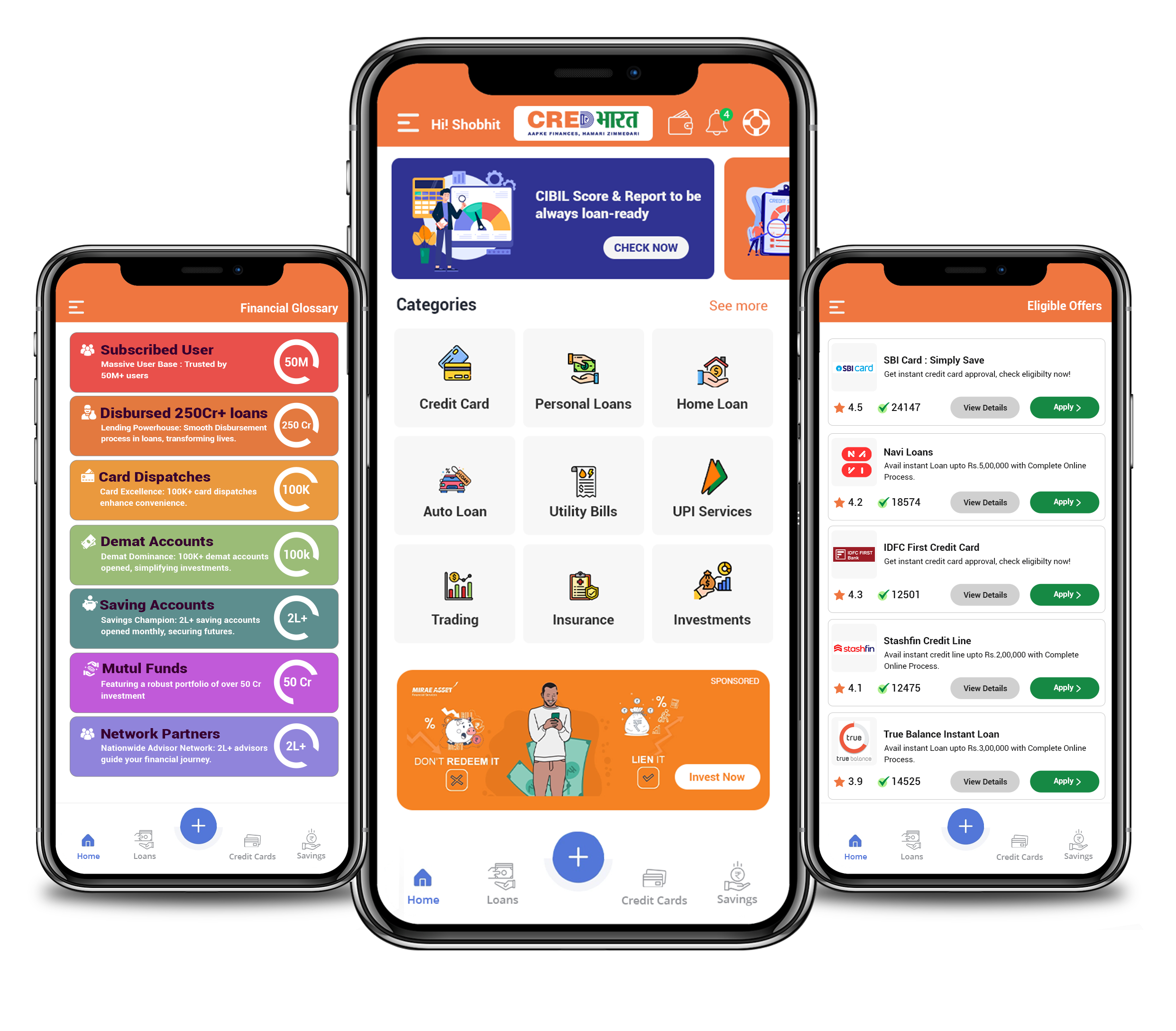Unlock Financial Opportunities with a Strong Credit Score
Your credit score is more than just a number; it's a key that can unlock a world of financial opportunities. Whether you're planning to apply for a loan, a credit card, or even rent an apartment, your credit score plays a pivotal role in determining your financial well-being. At CredBharat, we understand the significance of a healthy credit score and its impact on your financial journey.
Let's explore what a credit score is and why it matters!
-
What is a Credit Score?
A credit score is a three-digit numerical representation of your creditworthiness. It reflects your financial behavior and how responsibly you manage credit and debt. Credit scores typically range from 300 to 850, with higher scores indicating greater creditworthiness.
-
Why Does Your Credit Score Matter?
- Loan Approvals: Lenders use your credit score to assess the risk of lending to you. A higher score increases your chances of loan approval and often results in more favorable terms and lower interest rates.
- Interest Rates: A strong credit score can translate to lower interest rates on loans and credit cards. This can save you a significant amount of money over time.
- Credit Card Approvals: Credit card companies evaluate your credit score when deciding whether to approve your application and determine your credit limit.
- Renting an Apartment: Landlords often check credit scores to assess the financial responsibility of potential tenants. A good score can make it easier to secure a desirable rental property.
- Utility Services: Some utility companies may review your credit score when setting up new accounts. A higher score can mean lower security deposits.
- Insurance Premiums: Auto and home insurance providers may consider your credit score when calculating your premiums. A better score can result in lower insurance costs.
-
How is Your Credit Score Calculated?
- Payment History: Your track record of making on-time payments is a significant factor. Late payments can negatively impact your score.
- Credit Utilization: This refers to the amount of credit you're using compared to your credit limits. High credit card balances relative to your limits can lower your score.
- Length of Credit History: The length of time your credit accounts have been open can influence your score. Longer histories are generally more favorable.
- Types of Credit: A mix of credit types, such as credit cards, loans, and mortgages, can positively impact your score.
- New Credit: Opening multiple new credit accounts in a short period can lower your score.
These factors have different weightings in the calculation.
-
Monitoring Your Credit Score
Regularly monitoring your credit score is a smart financial habit. You can obtain a free credit report annually from major credit bureaus. Reviewing your report allows you to identify errors and take steps to improve your score.
-
How to Maintain a Healthy Credit Score?
If your credit score needs a boost, consider these strategies:
- Pay Bills on Time: Timely payments of credit card bills, loans, and utility bills are crucial for a positive credit history.
- Use Credit Wisely: Avoid maxing out your credit cards and try to maintain a low credit utilization ratio (credit used compared to your credit limit).
- Monitor Your Credit Report: Regularly review your credit report for errors and discrepancies that could negatively impact your score.
- Limit New Credit Applications: Avoid opening multiple new credit accounts in a short period, as this can temporarily lower your score.
- Establish a Credit History: If you're new to credit, consider starting with a secured credit card or becoming an authorized user on someone else's account.
-
Frequently Asked Questions
1. Where can I check my credit score?
- You can check your credit score through various credit reporting agencies (CRAs) like Equifax, Experian, and TransUnion. Many websites also offer free credit score checks.
2. What is a good credit score?
- Credit scores usually range from 300 to 850. A score above 700 is generally considered good, while scores above 800 are excellent.
3. Can I get a loan with a low credit score?
- Yes, you can still get a loan with a low credit score, but it may come with higher interest rates and less favorable terms. Consider improving your credit score before applying for a loan.
4. How long does negative information stay on my credit report?
- Most negative information, like late payments and collections, stays on your credit report for seven years. Bankruptcies may remain for up to ten years.
5. Can checking my credit score lower it?
- No, checking your own credit score is considered a soft inquiry and doesn't impact your score. However, hard inquiries made by lenders can have a temporary negative effect.
6. What should I do if I find errors on my credit report?
- If you find errors on your credit report, dispute them with the credit reporting agency by providing evidence of the inaccuracies. Correcting errors can positively affect your credit score.
7. Can my credit score change over time?
- Yes, your credit score is dynamic and can change as your financial behavior and credit history evolves. Responsible financial management can lead to score improvements.
8. How long does it take to see improvements in my credit score?
- The time it takes to see improvements in your credit score can vary based on your individual financial behavior. Timely payments and responsible credit management can lead to gradual score improvements over several months.






